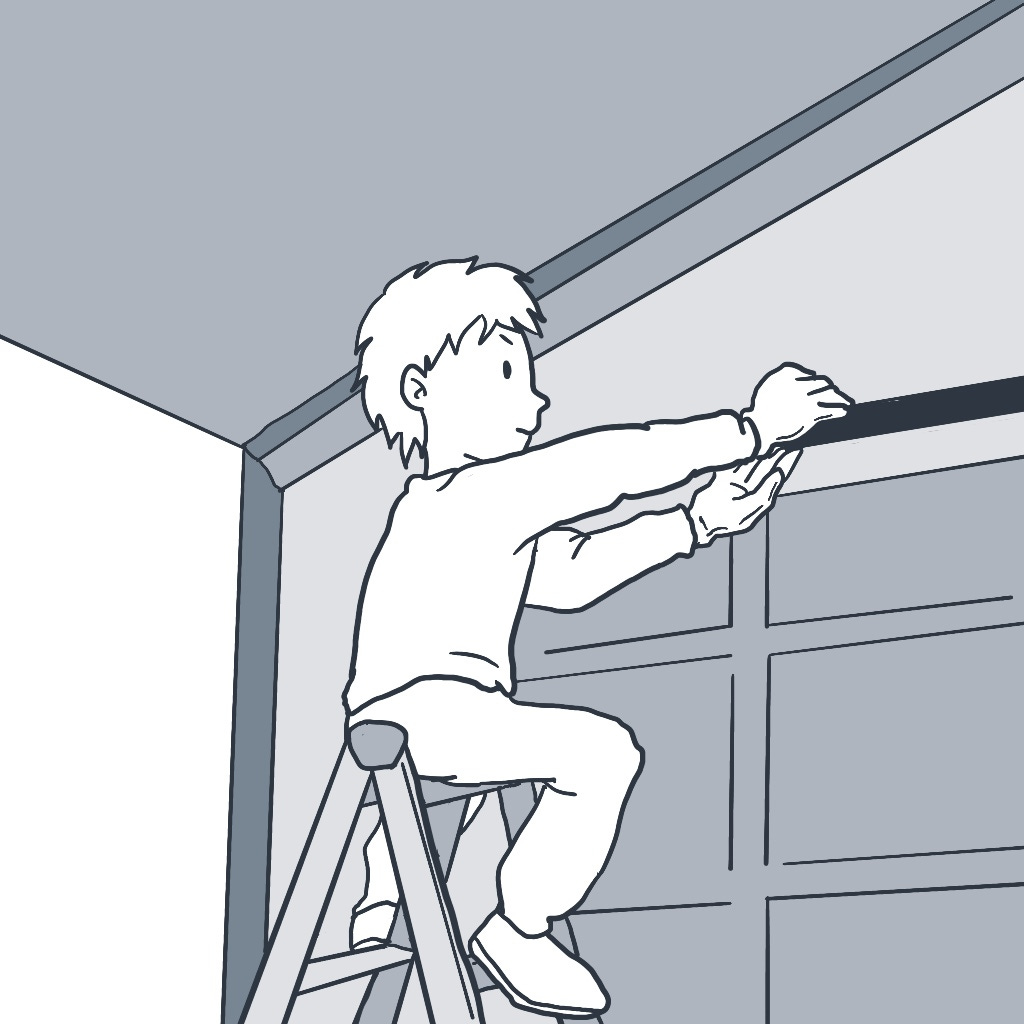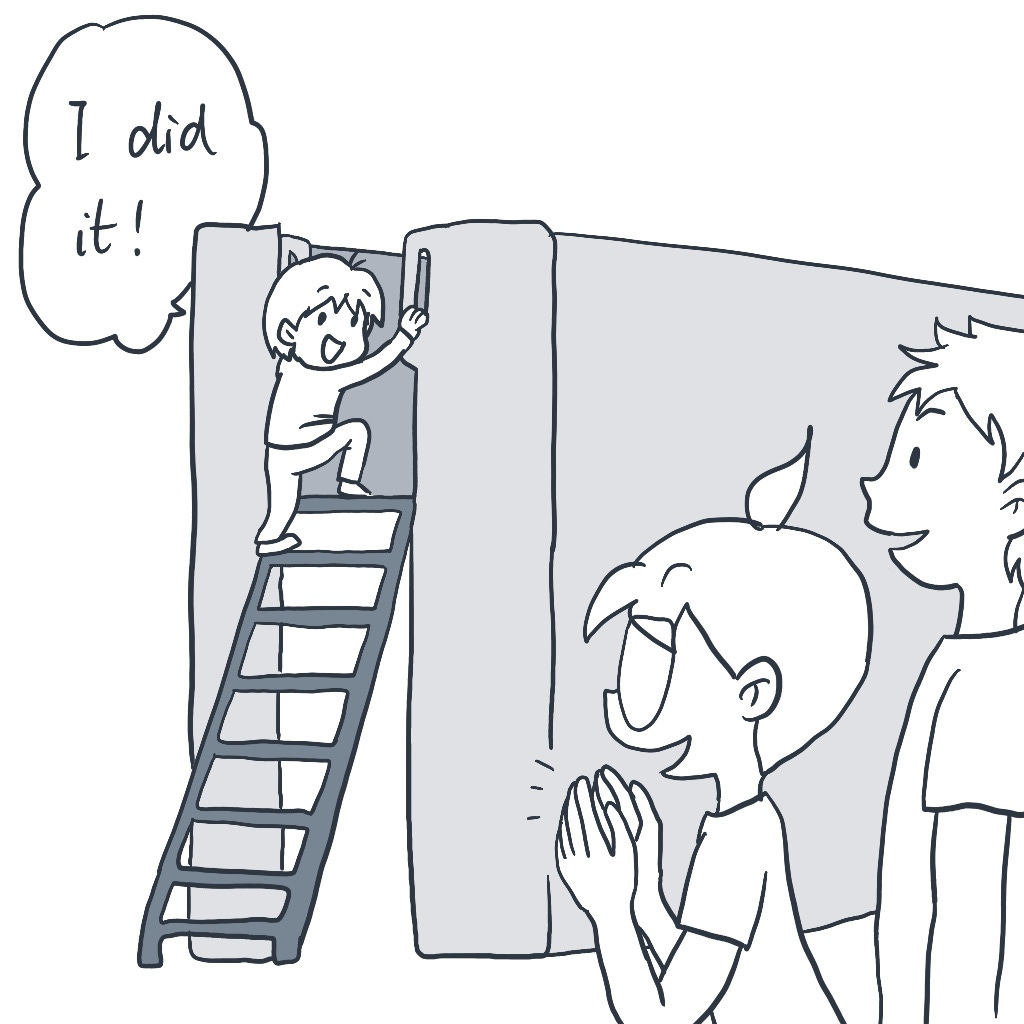Memolines ~ To my husband: thank you for walking alongside me
I have no doubt this can keep getting better and better, because as a team, we seem capable of accomplishing anything.
One day our little one broke a bottle of hand soap while washing her hands, and glass scattered across the floor. I quietly said, “Don’t move, watch out for the glass.” The moment those words left my mouth, so many similar scenes from over the years flashed through my mind.
I remember shortly after we got married, I slipped and broke a stack of bowls. When the crash echoed through the room, I froze completely. My husband rushed over and his first words were: “Don’t move, be careful not to cut your feet.” Then he crouched down with me to clean up the pieces, without a single complaint or word of blame.
Over all these years, every time I’ve messed something up—burned a dish, ruined rice, broken something—his reaction is always “let’s just cook it again” or “it’s fine, we’ll eat it like this.” I’ve tried to remember, and I really can’t recall him ever criticizing me for these things.
Now it’s my turn. When our daughter spills water everywhere, I show her how to mop it up; when glass breaks, I demonstrate how to clean it safely. No complaints, no blame, just calmly solving the problem.
I hope that in her memory, the first words she hears after making a mistake will always be concern, not criticism—that she won’t fear facing failures and mistakes, but will bravely take responsibility.
Watching our daughter grow day by day, seeing her start to treat the world the way we treat her, I often think about how these seemingly insignificant daily moments are actually shaping a person. Just like how my husband has influenced me over these years—quietly, yet so profoundly.
Time flies so fast—we’ve been married for so many years now. The rhythm between everyone in our family keeps getting better and better. I’ve become more confident, brave, and steady. I can say with certainty that since becoming an adult, my husband has been the person who’s influenced me most in becoming who I am today.
About my husband
My husband and I are different in so many ways. I’m generally someone who follows plans and sticks to routines. My path growing up was pretty typical—good at school, especially quiet as a child, and generally what adults would call well-behaved and pretty obedient. His path was completely different from mine: his experience boarding at school from a young age developed his independence and incredible adaptability. He’s principled yet spontaneous, with unexpected ideas always popping into his head.
At first, I wasn’t used to these differences at all—I thought he was way too unpredictable. But the longer we were together, the more I started to find this “unconventional approach” really interesting. When my plans got thrown off by his sudden ideas, though I had panics at first, we would often end up seeing completely different possibilities because of it. Gradually, I not only adapted to this rhythm, I even started looking forward to what new ideas he would bring. His way of thinking began subtly influencing me, making me more willing to try things outside my plans.
Sometimes I think he’s like a relaxed leopard. A leopard on the savanna appears to lounge lazily in the grass, but once it spots its prey, it leaps up and pursues that target with complete focus. When my husband has a clear goal, he puts all his energy into pursuing it. Whether it’s studying, changing careers, work, or home projects like replacing the air conditioner, expanding rooms, dealing with wasps, fixing plumbing, or taking care of our daughter—he puts his full attention on each thing he wants to do and always gets it done. I really admire this about him.
[Image: Husband fixing the garage door]
Recently, he noticed I was relying on my memory for taking vitamins and medications, sometimes getting frustrated when I forgot. So he developed a medication reminder iPhone app that’s convenient and simple—I use it every day now. Inspired by him, I also made a little app for our daughter to play with.
My husband’s devotion to family has deeply influenced me too. I used to be quite a workaholic, working to the point of neglecting everything else, not really understanding how he felt about things. But he’s really good at considering my feelings and puts our relationship and family needs first.
I remember years ago, my company division was acquired and my position was eliminated. Since I was on a work visa, I had limited time to find another job and had to focus completely on job searching. After more than a month, I finally got a job offer—I was both relieved and exhausted. I told my husband I really wanted to relax and go to Disney World.
At the time, my husband was approaching finals and had exams coming up, but he didn’t hesitate to say we should take a break and go. During our Disney trip, he brought his computer along, playing with me during the day and doing assignments at night. As for his classes during those days—he skipped them all. Missing so much class did affect his grade in one course, but he chose to support me when I really needed it.
After we had our daughter, he switched from a job that required daily office attendance to a fully remote position, giving him more flexible time and better coordination with family activities.
There have been so many moments like this in our life. Sometimes I tell my husband how grateful I am for his support. He always laughs and says, “What else would I do? Of course I would.”
Gradually, I caught up with his pace and learned to shift my attention from being completely focused on work to our little family. I started supporting him better, and we began taking better care of each other’s thoughts and feelings, finding a rhythm that really works for us.
60-60 marriage
We’ve never had a strict “you do this, I do that” arrangement. Overall, our division of labor is pretty equal, just not clearly defined—basically whoever’s available handles it. He cooks delicious food and takes care of most of our lunches and dinners. For breakfast, since it conflicts with his work schedule, I usually just throw something simple together.
A long time ago, he told me his life philosophy: when you’re walking through the house and see something that can be done easily, just do it without making a big deal about telling the other person you did extra or helped them out. For example, if one of us sees clean dishes in the dishwasher and has time, just put them away. If we’re both tired, we’ll leave it a bit longer until we feel like doing it—no big deal.
In the workplace, we emphasize clear responsibilities, individual accountability, and measurable performance. Everyone has their own job description with clearly defined duties, and there are year-end performance reviews to see who accomplished which KPIs. This management approach works well at work—it ensures projects move forward smoothly and prevents people from passing the buck.
But marriage isn’t the workplace. If you bring that “fair division of labor” and “performance evaluation” mindset home, it actually makes the relationship tense. Imagine if we had to write a “household responsibility list”: husband handles trash, plumbing, active play with kid; I handle laundry, organizing, arts and crafts with kid, then sit down monthly to review who did more or less—how exhausting would that be?
Family life is full of variables—sometimes someone gets sick, sometimes work gets crazy busy, sometimes the kid is particularly fussy. If we had to stick strictly to “divisions of labor,” we couldn’t flexibly handle these unexpected situations. More importantly, much of the “work” in a family can’t be quantified: whose hugs are warmer? Who tells more interesting bedtime stories? Who says more healing words when the other person is down? These can’t be measured by KPIs, yet they’re the most important things for family happiness.
I came across an article about “60-60 marriage,” which said couples don’t need clearly defined divisions of labor in marriage. What’s important is both people actively doing more for the family rather than insisting on “fair” divisions. If one person keeps track of what they’ve done and expects the other to do equivalent tasks to be fair—so each contributes exactly 50%—then naturally both will start keeping score of who’s contributed enough and who hasn’t, which easily leads to conflict. However, if both people have the mindset of doing a bit more for the family—each contributing 60%, even just a little more than 50%—life becomes easier and both become more understanding, willing to do more for each other and the family.
After reading this article, I was really struck—so there really is a name for this! We’d been doing exactly this all along, no wonder our relationship feels so easy. At lunch he’ll ask what I want to eat and go out of his way to make it for me; at night when I’m brushing my teeth and see he hasn’t brushed yet, I’ll squeeze toothpaste on his brush and hand it to him. I think our daughter has picked up on how Mommy and Daddy interact—now at the supermarket she’ll grab bags on her own to help us carry fruit.
With caring for our daughter, we continue this “whoever’s available” approach. When he’s free, he plays with her; when I’m free, I do. We don’t keep track of who spent how much time. Unless our little one is particularly clingy with one of us, then the other person makes an effort to spend more time with her. We each have our own ways of being with her: I do crafts, draw, and play with toys with her, while he takes her to parks and hiking. These different approaches aren’t right or wrong—they’re all good.
This probably explains why we didn’t need a nanny or helper when our daughter was born—this household was never just one person doing all the work. Before she was born, we made tons of dumplings and buns together and prepared lots of meals that just needed reheating. The moment our baby was born, he immediately learned from the nurses how to do everything from swaddling to diaper changes to feeding. After we came home, when I couldn’t move around easily, he basically handled all the baby care.
Now our daughter, under our guidance, is gradually becoming independent and self-reliant. From eating independently and sleep training to making decisions on her own, this gives us great confidence facing the arrival of our second baby.
Over time, whether in big or small matters, we naturally support each other. Especially when one of us isn’t feeling well or is going through a tough time, the other person ends up doing way more, but we don’t expect payback to be fair.
But we’re not mind readers—we don’t always know what the other needs. When he needs help, he tells me directly. If it’s something complicated, like when we were expanding our house, he would clearly explain how I could best help him. I used to not get this and would expect him to automatically sense what I needed. But now I’ve learned to communicate directly too, saying things like “I need to go nap, can you watch the baby for a bit” or “can you unload the dishwasher.” This way we have normal communication—help if you can, don’t if you can’t. No hiding needs and expecting the other person to guess your thoughts. I might have thought mind-reading was normal before, but looking back, that was such an exhausting way to live—why bother? What’s wrong with just saying what you need? Honest communication makes both of us way more relaxed.
Because of him, I’ve become more mature and independent
Through these years with my husband, I’ve realized I have a much more independent sense of self. Beyond having lots of space to do our own things, what’s more important is a shift in mindset.
Respecting each other’s boundaries
In getting to know my husband, I’ve gradually come to understand and appreciate his clear sense of boundaries. He really respects my independent personality and way of doing things, never trying to change me. For instance, I like making plans and following steps—he never says “you’re too rigid” or “just relax.” When I get hung up on small things for a long time, he’ll patiently listen to me talk it through, then offer some suggestions, but whether I take his advice is completely up to me.
At first, I’d try to “help” him become more organized, but this often created tension between us. Later I realized he has his own style and rhythm for doing things, and I have my own methods. Since he never tries to change me, why should I try to change him? We learned to accept each other’s styles and adjust when needed. This way of being together is so much more relaxed.
As our daughter grows, she’s also developing this sense of boundaries. We started having her sleep in her own room early on, telling her “baby sleeps in baby’s room, Mommy and Daddy sleep in Mommy and Daddy’s room.” Sometimes when she can’t sleep, she’ll come out of her room, and we’ll hear her little feet pattering back and forth. Sometimes her footsteps stop in front of our door, but she won’t just open it and come in—sometimes she’ll stand there for a while then walk away. We don’t proactively open the door either. Watching her like this, I feel like she’s learning to respect other people’s space while also trying to handle her own emotions and needs.
Come to think of it, my husband’s sense of boundaries is also kind of a family tradition. Because of his early experience boarding at school, he gained the autonomy his family gave him from a young age—they didn’t micromanage everything, giving him lots of space to grow. This gradually built up everyone’s sense of boundaries.
My mother-in-law treats us the same way now. Over these years, she’s lived with us for almost a year total, and never once interfered with how we do things, especially respecting our parenting approach. For some of our ways of doing things, as someone from an older generation, she has different views, but she chooses to look the other way. For example, when we were sleep training our baby, if it wasn’t out-of-control crying, we’d let her cry for a while before stepping in. During these times, my mother-in-law couldn’t bear to listen, but she understood it was a necessary process, so she’d put on headphones or just go out for a walk. She’ll share experiences from her generation with me, but never in a demanding tone telling me I should do things a certain way—it’s more like casual conversation. We can have peaceful chats about our different thoughts. If I disagree she’ll smoothly say “all roads lead to Rome” and we move on.
I think this is just how their family operates—trusting family members’ abilities and giving each other enough space and respect. So during her visits, I feel completely comfortable because I can be 100% myself.
No longer depending on outside validation
I’m naturally very organized, efficient, and detail-oriented, but in my early career right after school, I was often insecure and needed recognition from family and supervisors to feel valuable. When I didn’t get this recognition, I would feel like a total failure. Sometimes when I accomplished something, I’d tell my husband and he’d give me some encouraging words.
But he also once told me: “Your excellence isn’t built on other people’s approval—it’s like how a substance’s chemical properties are determined by internal factors.” That’s just how he is, not caring much about outside opinions, but it took me a long time to really understand what he meant. Through being with him and gaining more life experience, when I can do my best effort, I feel good about myself without needing to expect or crave others’ approval. This mindset has made me so much more relaxed.
I think this inner confidence has unconsciously passed to our daughter too. I remember one day at the park when she was climbing high, she suddenly said “I’m so good!” She wasn’t waiting for us to praise her—she was genuinely proud of her own achievement. Not only that, she often cheers for herself after accomplishing something: “I did it!” I’m so happy for her.
Learning to advocate for myself
Another thing I really admire about my husband is his willingness to stand up for himself. He worked in the service industry for a while, so he has high standards for customer service. When he encounters crappy service or people trying to brush him off, he’ll contact the service provider to protect his interests.
This was something I had almost never done before. I had all sorts of reasons for not wanting to: sometimes thinking “forget it, whatever you say goes,” not wanting to get into conflicts; sometimes not knowing how to respond and just staying quiet. But I don’t think this way anymore, because this is exactly about advocating for my own interests. If I can’t even make sure I get the service I’m paying for and just act all gracious about it, that’s actually not normal.
When I see him protecting his rights, I’m really supportive and admiring, and I hope someday I can always do the same without getting all worked up about it. I’ll admit, sometimes when I try to advocate for these rights now, I still feel a bit awkward, a bit pushy. But my thinking has totally changed: why should I just accept it? If I paid for a service, I need to understand what’s going on—if I don’t advocate for my own interests, who will?
This attitude is important in so many areas of life, from small things like being overcharged for something to bigger things like fighting for promotions at work or facing unfair treatment. I need to learn to do this myself and teach our daughter to do the same. This is a really important step in becoming independent.
Reflections
I increasingly love our life rhythm. Even with all the complexity of life and work, I can still maintain this sense of ease. This ease comes from clearly knowing where my life’s center is—family comes first, and everything else gets prioritized based on that. I have no doubt this can keep getting better and better, because as a team, we seem capable of accomplishing anything.
The most important thing for two people together is mutual support, protection, and admiration. When we admire each other, we can always think the best of each other and enjoy each other’s company. Sometimes when we’re tired and don’t want to move, we just rest. When we feel like it, we tackle things together. People don’t need to keep themselves constantly wound up.
He truly deserves to be called the person who’s influenced me most positively since becoming an adult. We don’t have any grand long-term plans, but this flexible approach to life fills us with confidence. Living each day in this family, I feel like I’m always at my best, and that feeling itself is worth celebrating.
We also hope that through our subtle influence, our daughter will learn this relaxed yet steady approach to life.
Thank you for walking alongside me.






How delightful Yingying! I smile with joy, remembering your wedding in the garden. And, "facing the arrival of our second baby"? Do let us know when this happens.